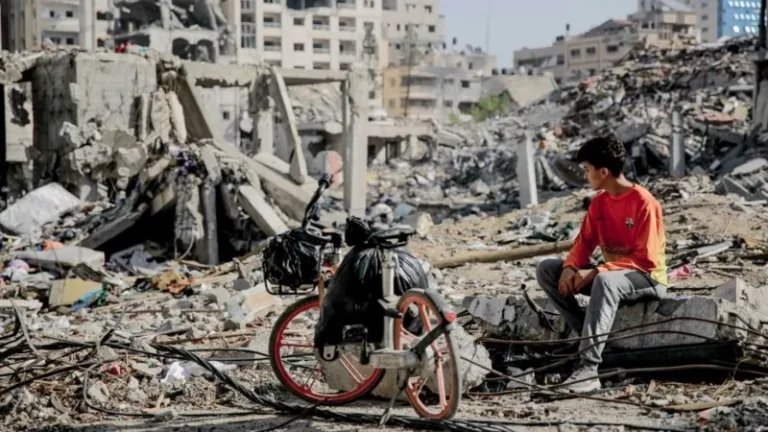Gaza War — Critical 59,000 Dead: Hamas Accuses US of Complicity in Gaza and Peace Obstruction

A young man sits amidst the ruins in Gaza, a stark symbol of the ongoing tragedy. 26/7/2025
July 26, 2025 Hour: 8:38 am
Hamas accuses the US of complicity in the Gaza war, blocking peace talks and enabling Israel’s military campaign. With over 59,000 dead, the humanitarian crisis demands urgent global action.
Related: Gaza Faces Catastrophic Malnutrition Crisis as Aid Blockade Deepens
Geopolitical Context Behind Hamas US Complicity in Gaza War
The Hamas US complicity in Gaza war has become a central point of contention in the ongoing conflict, as the Palestinian resistance movement accuses the United States of actively undermining peace negotiations and shielding Israel from accountability. On Saturday, July 22, 2025, Hamas issued a strongly worded statement condemning the Trump administration’s role in derailing ceasefire talks and supporting what it describes as a systematic campaign of extermination in the Gaza Strip.
This accusation comes amid a deepening humanitarian and military crisis, with over 59,000 Palestinians killed since October 7, 2023, and more than two million civilians trapped under a suffocating blockade. The U.S., under President Donald Trump, has not only maintained military and political support for Israel, but also withdrew from peace negotiations, claiming Hamas lacks the will to reach a deal — a claim Hamas and regional mediators have strongly rejected.
🔗 Reuters – USAID Gaza Aid Report
Hamas Accuses US of Shielding Israel and Sabotaging Peace
In a sharp rebuke, the Hamas US complicity in Gaza war was explicitly denounced in a statement released on Saturday morning, accusing the United States of distorting peace efforts and protecting the Israeli occupation. The group expressed outrage at claims by Donald Trump and his special envoy, Steve Witkoff, that Hamas lacks seriousness in negotiations.
“This is a false narrative that contradicts the reality on the ground and the assessments of regional mediators,” said Izzat al-Rishq, Hamas spokesperson. He emphasized that Egypt and Qatar, the primary mediators, have recognized the Palestinian delegation’s constructive and flexible approach.
Al-Rishq stressed that the main obstacle to a ceasefire is Prime Minister Benjamin Netanyahu, who, according to Hamas, has repeatedly evaded commitments and undermined the peace process.
🔗 Al Jazeera – Gaza Mediation Efforts
Rejection of Aid Diversion Allegations
Hamas also dismissed U.S. allegations that it has diverted humanitarian aid destined for Gaza. The group cited a recent USAID investigation, reported by Reuters, which found no evidence linking Hamas to aid theft or misuse.
“The distribution of humanitarian aid must be managed solely by accredited UN agencies, without Israeli interference,” al-Rishq stated, calling for transparent, impartial oversight to ensure aid reaches the 2.3 million civilians suffering under the blockade.
The movement reiterated that any diversion of aid would be a violation of its principles and a betrayal of the Palestinian people.
Hamas Demands US End Support for Israel
In its statement, Hamas called on the United States to cease its political and military backing of Israel, which it accuses of conducting a “war of extermination” and enforcing a genocidal blockade that has led to widespread starvation, disease, and death.
The group urged Washington to exert real pressure on Netanyahu to accept a comprehensive ceasefire agreement, including:
- Unrestricted humanitarian access
- A prisoner exchange deal
- An end to abuses against Palestinian detainees in Israeli prisons
This demand comes in response to Trump’s announcement on Friday that the U.S. is withdrawing from ceasefire talks, claiming Hamas is “not interested in peace” and advocating for its elimination — a stance that has drawn criticism from humanitarian and diplomatic circles.
Regional Mediation and Peace Proposals
Despite the U.S. withdrawal, regional mediators — Egypt and Qatar — continue to affirm that the Palestinian delegation remains committed to negotiations. These countries have facilitated backchannel communications aimed at de-escalating hostilities and establishing a sustainable ceasefire.
Hamas has submitted a formal counter-proposal to Witkoff’s peace plan, which includes key demands such as:
- UN-supervised humanitarian corridors
- Reduction of Israeli buffer zones that restrict civilian movement
- Guarantees for the return of displaced families
“These are not maximalist demands — they are basic humanitarian and security needs,” said a Palestinian negotiator speaking anonymously.
International Law and the Risk of Impunity
Legal experts and human rights organizations warn that continued U.S. support for Israel’s military campaign — including arms sales, diplomatic cover, and financial aid — may constitute complicity in war crimes under international law.
“When a state enables another to commit atrocities, it shares responsibility,” said a legal advisor with Amnesty International. “The world cannot afford to look away while civilians are being starved and bombed.”
The UN Human Rights Council and International Criminal Court (ICC) have already opened investigations into potential violations, but enforcement remains limited due to geopolitical resistance, particularly from the U.S. and its allies.
🔗 UN Human Rights Council – Gaza Reports
Conclusion: A Call for Accountability and Peace
The Hamas US complicity in Gaza war accusation is more than a political statement — it is a moral and legal indictment of U.S. foreign policy in the region. As the death toll climbs and humanitarian conditions worsen, the world faces a critical choice: continue enabling violence or demand accountability and justice.
Hamas insists it is ready to negotiate, but only if the ceasefire process is fair, transparent, and free from bias. The path to peace requires not just dialogue, but a fundamental shift in international power dynamics — one that prioritizes human rights over geopolitical interests.
Author: JMVR
Source: Al Madayeen

